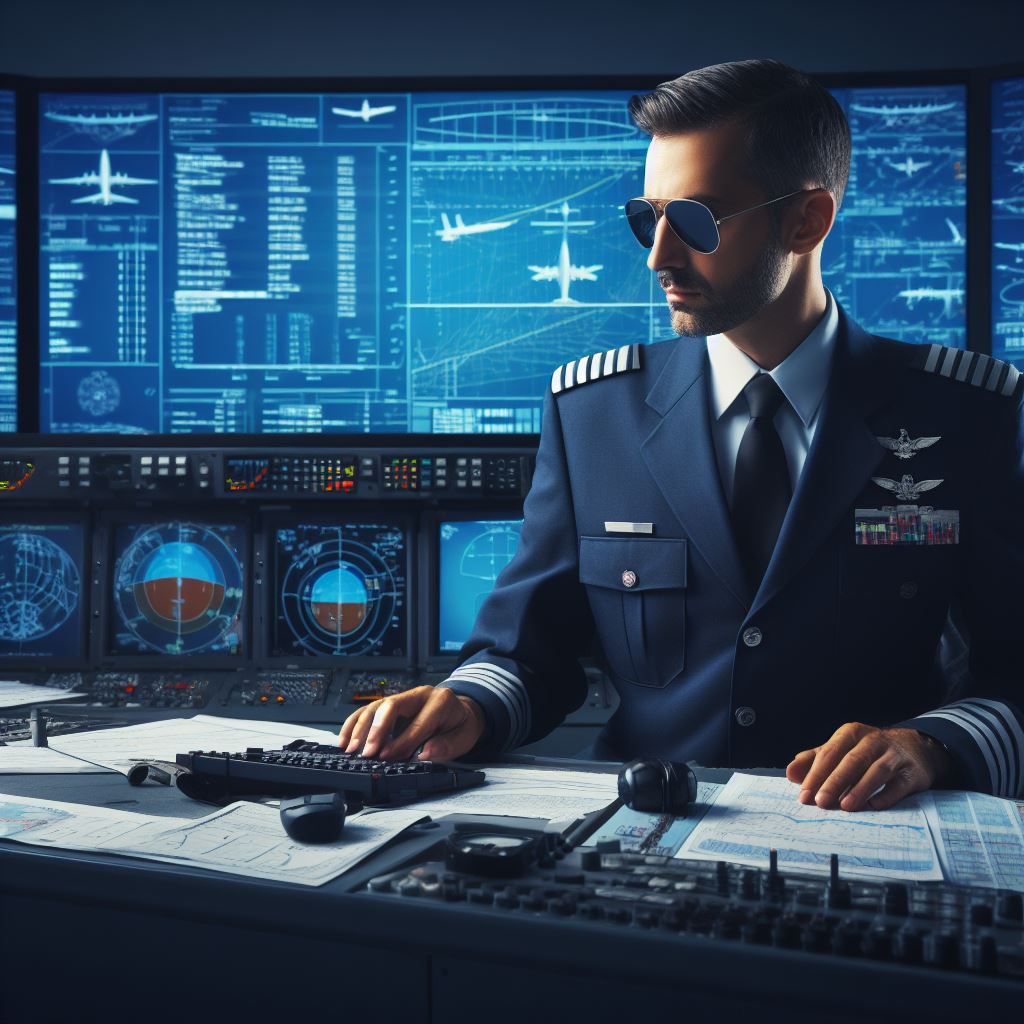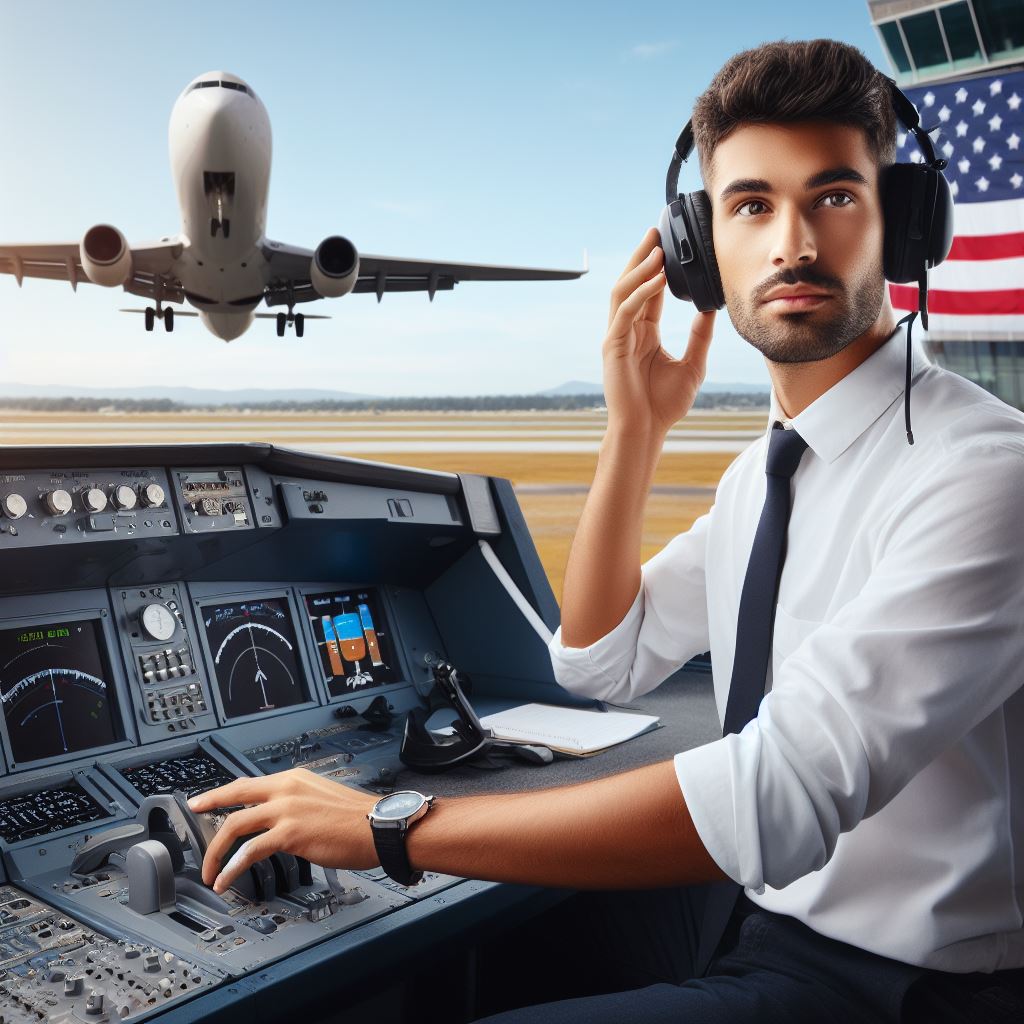Introduction
The aviation industry plays a significant role in the global carbon emissions.
Pilots wield substantial influence in mitigating aviation’s environmental impact.
Fuel-efficient flying techniques and updated technologies minimize emissions.
Ongoing training ensures pilots adopt eco-friendly practices, promoting sustainability within the aviation industry.
The selection of efficient routes and altitude adjustments significantly reduces fuel consumption, underscoring pilots’ pivotal role in environmental stewardship.
Advancements in aircraft design and alternative fuels further demonstrate the industry’s commitment to eco-conscious practices.
Pilot awareness and implementation of sustainable measures contribute significantly to reducing the carbon footprint of air travel.
In addition, collaborative efforts among pilots, airlines, and aviation authorities play a vital role in developing and adopting environmentally friendly practices.
Continuous innovation in aircraft technology, guided by informed pilot decisions, leads the charge toward a greener aviation future.
Pilots, as frontline ambassadors, embody the commitment to balance the soaring demand for air travel with responsible environmental practices.
Acknowledging the substantial environmental impact of aviation, pilots actively engage in steering the industry toward a more sustainable and eco-friendly trajectory.
It is crucial to discuss how pilots contribute to the environmental impact of air travel.
Role of Aviation in Climate Change
Aviation industry significantly contributes to greenhouse gas emissions, playing a crucial role in climate change.
Contribution of Aviation Industry to Greenhouse Gas Emissions
- Airplanes emit carbon dioxide (CO2), methane, nitrous oxide, and other pollutants into the atmosphere.
- Jet fuels release CO2 during combustion, accounting for a significant portion of aviation’s carbon footprint.
- Moreover, aircraft engines emit nitrogen oxides, which contribute to the formation of greenhouse gases.
- Aviation is responsible for nearly 2% of global CO2 emissions, equivalent to around 900 million metric tons annually.
- Additionally, the industry emits other pollutants that have a warming effect, exacerbating climate change.
Global Impact of Aviation on Climate Change
- Aviation’s impact on climate change is not limited to local areas but has global consequences.
- Aircraft emissions have a significant warming effect, contributing to the overall rise in global temperatures.
- Aviation’s emissions of CO2 and other greenhouse gases lead to the intensified greenhouse effect.
- The industry exacerbates the formation of contrails, which also contribute to global warming.
- Furthermore, aviation impacts the ozone layer, depleting it and causing further climate-related consequences.
Statistics and Data Supporting Aviation’s Climate Change Impact
- According to the Intergovernmental Panel on Climate Change (IPCC), aviation emissions are projected to increase by up to 700% by 2050.
- Studies indicate that aviation emissions could contribute to a temperature increase of around 0.03°C per year.
- The Air Transport Action Group (ATAG) states that aviation is responsible for about 12% of CO2 emissions from all transportation sources.
- Furthermore, a study estimates that aviation’s non-CO2 emissions multiply the warming impact by a factor of two to four.
- The International Civil Aviation Organization (ICAO) aims to achieve carbon-neutral growth from 2020 onwards.
Basically, the aviation industry has a substantial role in climate change, primarily through its contribution to greenhouse gas emissions.
The sector’s emissions, including CO2 and other pollutants, have both local and global impacts.
As the industry continues to expand, it is essential to implement sustainable practices and technological advancements to mitigate its environmental footprint.
Read: Essential Skills Every Pilot Needs to Succeed
Environmental Regulations in Aviation
In order to minimize the environmental impact of aviation, various regulations have been put in place.
These regulations aim to reduce emissions, noise pollution, and overall environmental harm caused by the aviation industry.
Existing Regulations to Minimize Environmental Impact
- Emissions Control: The International Civil Aviation Organization (ICAO) has developed standards to limit greenhouse gas emissions from aircraft engines.
- Noise Reduction: Regulations require the use of quieter aircraft technology and restrict the operation of noisy aircraft in certain areas.
- Fuel Efficiency: Airlines are encouraged to use fuel-efficient aircraft and adopt measures to reduce fuel consumption.
- Waste Management: Regulations govern the proper disposal of waste generated during flights and aim to minimize environmental pollution.
- Water Management: Guidelines are in place for the management and treatment of wastewater generated by aircraft.
International Civil Aviation Organization (ICAO)
The International Civil Aviation Organization (ICAO) is a specialized agency of the United Nations that sets international standards and regulations for the safe and sustainable development of civil aviation.
Transform Your Career Today
Unlock a personalized career strategy that drives real results. Get tailored advice and a roadmap designed just for you.
Start NowIt plays a crucial role in minimizing the environmental impact of aviation.
The ICAO’s main objective is to promote the safe and efficient use of airspace and airports, while also addressing environmental concerns.
It works closely with member states and industry stakeholders to develop policies and regulations that support sustainable aviation practices.
Through its Committee on Aviation Environmental Protection (CAEP), the ICAO develops and updates standards and practices related to aircraft emissions, noise levels, and fuel efficiency.
It also promotes research and innovation in aviation technologies to further reduce environmental impact.
Role of Governments in Enforcing Environmental Regulations
Governments play a crucial role in enforcing environmental regulations for airlines.
They work in collaboration with international organizations like the ICAO to develop and implement policies that promote sustainable aviation practices.
Government agencies are responsible for monitoring compliance with environmental regulations by conducting regular inspections and audits of airlines and airports.
They have the authority to impose fines and penalties on non-compliant entities, ensuring that environmental standards are upheld.
Furthermore, governments provide incentives and support to encourage airlines to adopt environmentally-friendly practices.
These may include tax benefits for using sustainable fuels or offering funding for research and development of clean aviation technologies.
By enforcing environmental regulations and promoting sustainable practices, governments contribute to the overall reduction of environmental impact in the aviation industry.
Generally, environmental regulations in aviation are crucial to minimize the industry’s impact on the environment.
Organizations like the ICAO play a significant role in developing standards and practices, while governments enforce these regulations to ensure compliance.
With continued efforts, the aviation industry can achieve sustainable growth while reducing its environmental footprint.
Read: Common Misconceptions About Pilots Debunked!
Measures Taken by Pilots to Reduce Environmental Impact
Advancements in Aircraft Technology for Fuel Efficiency
In the pursuit of reducing environmental impact, pilots have actively embraced advancements in aircraft technology.
These advancements primarily focus on improving fuel efficiency.
The aviation industry has made remarkable progress in developing and implementing innovative technologies that optimize fuel consumption.
Aircraft manufacturers continually strive to build aircraft that are lighter, more aerodynamic, and require less fuel to operate.
Transform Your Career Today
Unlock a personalized career strategy that drives real results. Get tailored advice and a roadmap designed just for you.
Start NowNewer models are equipped with state-of-the-art engines that burn fuel more efficiently, producing fewer emissions and allowing for considerable fuel savings.
Furthermore, pilots are trained to utilize these advanced aircraft systems effectively.
They are educated on the optimal use of engines, flight control systems, and energy management strategies to maximize fuel efficiency during flight.
These advancements not only decrease the environmental impact but also result in significant cost savings for the airlines, further motivating the incorporation of fuel-efficient technologies.
Sustainable Aviation Fuels (SAF)
Pilots also contribute to reducing the environmental impact by utilizing sustainable aviation fuels (SAF).
SAFs are alternative fuels made from renewable resources.
Unlike traditional jet fuels derived from fossil fuels, sustainable aviation fuels are produced using feedstocks such as plant oils, algae, agricultural waste, or even household waste.
By utilizing SAFs, pilots reduce the overall carbon footprint of their aviation operations.
These alternative fuels have the potential to reduce greenhouse gas emissions by up to 80% compared to conventional jet fuels.
Efforts are underway to increase the production and availability of SAFs around the world, and pilots play a crucial role in encouraging the use of these sustainable alternatives.
Proper Flight Planning and Optimization Techniques
Pilots are well aware of the significance of proper flight planning and optimization techniques in minimizing environmental impact.
Through careful analysis of weather patterns, wind conditions, and aircraft performance, pilots can optimize flight routes to reduce fuel burn and emissions.
Flight management systems provide real-time data that allows pilots to make informed decisions, ensuring efficient flight operations.
Additionally, pilots practice techniques such as continuous descent approaches and idle reverse thrust landings to minimize noise and emissions during takeoff and landing phases.
These planning and optimization efforts effectively contribute to decreasing environmental impact by reducing fuel consumption and emissions throughout the entire flight.
Initiatives by Pilot Associations or Airlines
To address the pressing environmental concerns, many pilot associations and airlines have taken proactive steps to minimize their ecological footprints.
They have spearheaded initiatives to promote sustainability within the industry by developing comprehensive sustainability strategies and setting environmental targets.
These initiatives focus on multiple aspects, including investing in more fuel-efficient aircraft, supporting research and development for cleaner aviation technologies, and implementing carbon offset programs.
Pilot associations and airlines also collaborate with regulatory bodies and governments to advocate for stricter environmental regulations and foster a culture of environmental responsibility within the aviation industry.
By joining forces, pilots, associations, and airlines continue to make significant strides in reducing the environmental impact of air travel.
Transform Your Career Today
Unlock a personalized career strategy that drives real results. Get tailored advice and a roadmap designed just for you.
Start NowEssentially, pilots play a crucial role in mitigating the environmental impact of aviation.
Through advancements in aircraft technology, utilization of sustainable aviation fuels, proper flight planning, and participation in initiatives to minimize environmental impact, pilots actively contribute to a greener and more sustainable aviation industry.
Read: Medical Requirements for Pilots: What You Need to Know

Gain More Insights: An Overview: The Role of a Train Conductor in the USA
Collaboration between Pilots and Air Traffic Controllers
The coordinated efforts to reduce carbon emissions
- Pilots and air traffic controllers work together to minimize flight time and fuel consumption.
- They collaborate to optimize flight routes, reducing carbon emissions.
- By coordinating ground operations and flight paths, pilots and controllers aim to minimize environmental impact.
The importance of efficient air traffic management
- Efficient air traffic management reduces congestion and delays, leading to fuel savings.
- With better management, aircraft spend less time waiting on the ground or circling in the air.
- This leads to lower carbon emissions and better overall environmental performance.
Role of pilots and air traffic controllers in optimizing flight routes
- Pilots and air traffic controllers constantly communicate to find the most efficient flight routes.
- By considering weather conditions, wind patterns, and airspace restrictions, they choose optimal paths.
- Pilots rely on air traffic controllers for up-to-date information and guidance to navigate the skies effectively.
- Pilots and controllers actively collaborate to avoid congested airspace, which reduces emissions.
- They use advanced technology and data to identify the most environmentally friendly flight routes.
- By choosing shorter routes or altitudes with less turbulence, fuel consumption can be minimized.
- Pilots play a crucial role by following air traffic controllers’ instructions accurately.
- They adhere to the designated flight paths and speed restrictions, ensuring smooth operations.
- Pilots also make continuous adjustments based on real-time information provided by controllers.
- Air traffic controllers monitor the airspace and optimize the flow of air traffic.
- Their priority is to maintain safe and efficient operations while considering environmental concerns.
- They actively guide the pilots to avoid conflicts and find the most efficient routes.
- Pilots and air traffic controllers follow regulations and procedures aimed at reducing environmental impact.
- These include practices like continuous descent approaches and efficient use of taxiways.
- By incorporating these techniques, they strive to minimize fuel burn and carbon emissions.
- Collaborative efforts extend beyond individual flights. Pilots and controllers share knowledge and best practices.
- They participate in training programs to improve their understanding of environmental impact reduction.
- By working together, they contribute to ongoing research and development in the aviation industry.
- The collaboration between pilots and air traffic controllers is crucial for a sustainable aviation industry.
- Their coordinated efforts result in reduced carbon emissions, lower fuel consumption, and overall environmental performance.
In fact, pilots and air traffic controllers play a significant role in minimizing the environmental impact of aviation.
Through coordinated efforts, they work together to reduce carbon emissions, optimize flight routes, and ensure efficient air traffic management.
Their collaboration and adherence to environmentally friendly practices contribute to a more sustainable aviation industry.
Read: Behind the Scenes: The Role of Dispatchers in Trucking
See Related Content: Balancing Demand & Supply: U.S. Logistician’s Core Tasks
See Related Content: Sustainability in U.S. Logistics: Role of the Modern Logistician
Pilot Training and Environmental Awareness
Inclusion of Environmental Topics in Pilot Training Programs
- Pilot training programs have started including environmental topics to create awareness.
- These topics cover the impact of aviation on the environment and sustainable practices.
- Pilots are trained on fuel-efficient flight techniques and reducing carbon emissions.
- Understanding the environmental consequences helps pilots make informed decisions during flights.
- Environmental training equips pilots with knowledge to minimize negative impacts on nature.
Significance of Enhancing Pilots’ Awareness about Environmental Issues
- Pilots play a crucial role in minimizing aviation’s impact on the environment.
- Awareness about environmental issues allows pilots to adopt eco-friendly practices.
- They can actively contribute to reducing greenhouse gas emissions and conserving resources.
- Enhanced awareness helps pilots make sustainable choices during flight planning and operations.
- Pilots with environmental awareness are advocates for a greener future in the aviation industry.
Importance of Ongoing Education and Updating Knowledge on Environmental Best Practices
- Ongoing education ensures pilots have up-to-date knowledge about environmental best practices.
- New research and technological advancements constantly provide insights into minimizing aviation’s impact.
- Pilots need to stay informed about emerging practices for reducing carbon footprint.
- Regular training and knowledge updates enable pilots to adapt to environmental regulations.
- Continuous learning allows pilots to be proactive in implementing eco-friendly measures in their operations.
By including environmental topics in pilot training programs, pilots gain a comprehensive understanding of the impact of aviation on the environment and the importance of adopting sustainable practices.
Such training equips them with the knowledge to make informed decisions that minimize negative environmental consequences during flights.
The significance of enhancing pilots’ awareness about environmental issues cannot be understated.
Pilots, being key players in the aviation industry, have the power to make a significant difference in reducing environmental impact.
By increasing awareness, they are better equipped to adopt eco-friendly practices and actively contribute to reducing greenhouse gas emissions and conserving resources.
Ongoing education and updating knowledge on environmental best practices is vital for pilots.
As new research and technological advancements constantly provide insights into minimizing aviation’s impact, pilots need to stay informed about emerging practices for reducing their carbon footprint.
Regular training and knowledge updates enable pilots to adapt to environmental regulations and be proactive in implementing eco-friendly measures in their operations.
With continuous learning, pilots can actively contribute to a greener future in the aviation industry.
In general, pilot training programs that include environmental topics are essential to create awareness and understanding of the impact of aviation on the environment.
Transform Your Career Today
Unlock a personalized career strategy that drives real results. Get tailored advice and a roadmap designed just for you.
Start NowEnhancing pilots’ awareness about environmental issues empowers them to make sustainable choices and actively contribute to minimizing environmental impact.
Ongoing education and updating knowledge on environmental best practices ensure pilots stay informed and can proactively implement eco-friendly measures.
The collaboration between pilot training and environmental awareness is crucial in achieving a greener future for aviation.
Conclusion
Pilots play a crucial role in minimizing environmental impact through various practices.
The blog post highlighted how pilots can reduce fuel consumption, optimize flight paths, and use sustainable technologies.
It is important to recognize and emphasize the crucial role pilots play in protecting the environment.
By supporting eco-friendly initiatives in aviation, such as investing in sustainable aviation fuels, readers can contribute to a greener future.
Together, we can create a sustainable aviation industry that prioritizes environmental preservation.
[E-Books for Sale]
The Big Book of 500 High-Paying Jobs in America: Unlock Your Earning Potential
$19.99 • 500 High-Paying Jobs • 330 pages
Explore 500 high-paying jobs in America and learn how to boost your career, earn more, and achieve success!
See All 500 High-Paying Jobs of this E-Book
1001 Professions Without a Degree: High-Paying American Jobs You Can Start Now
$19.99 • 1001 Professions Without a Degree • 174 pages
Discover 1001 high-paying jobs without a degree! Unlock career tips, skills, and success strategies for just $19.99!




